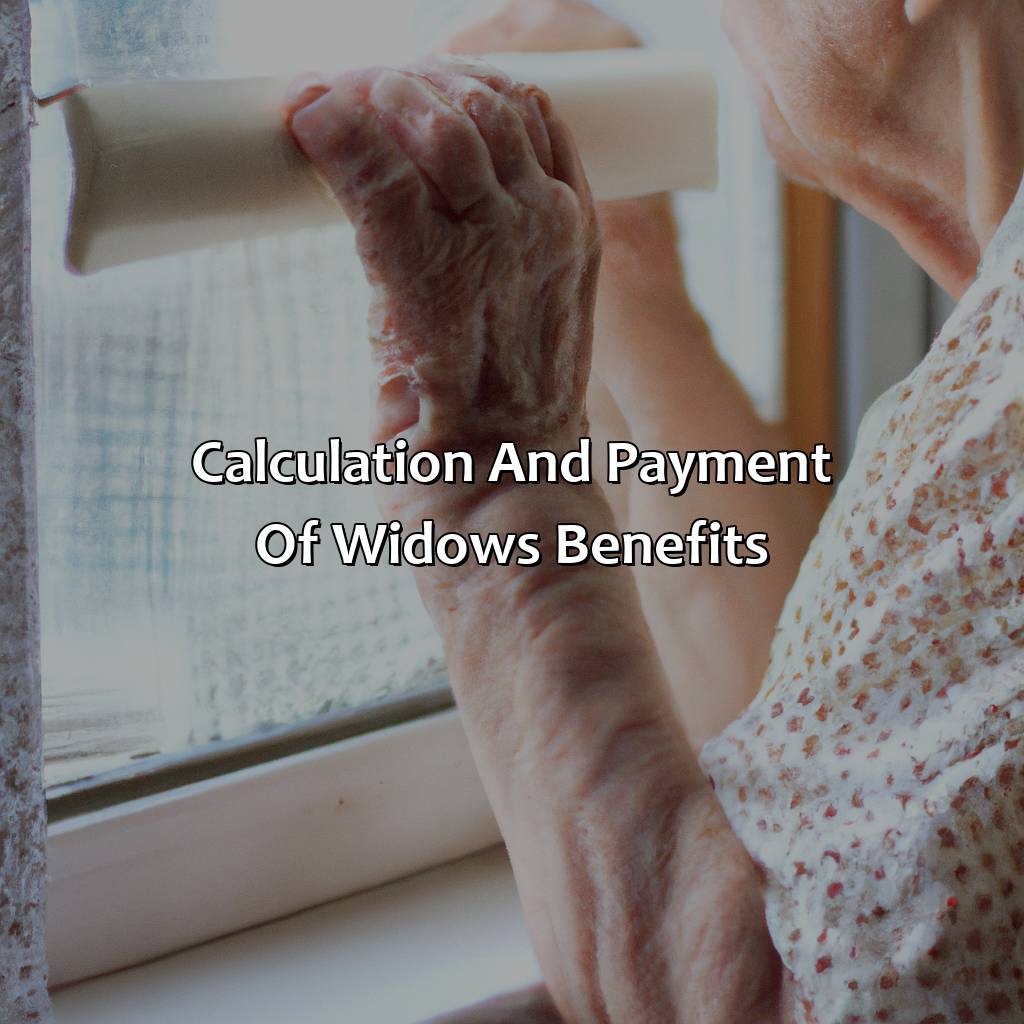When Can A Widow Collect Her Husband’S Social Security?
Key Takeaway:
- To be eligible for Social Security benefits, the deceased spouse must have earned enough credits to qualify for benefits, and the surviving widow must meet age and other requirements.
- A widow may qualify for survivor’s benefits if she is age 60 or older, or age 50 or older if she has a disability, and was married to the deceased for at least nine months.
- The amount of the widow’s benefit depends on factors such as the deceased spouse’s earnings, the widow’s age, and whether the widow has other sources of income. Retroactive benefits may be available under certain circumstances.
Are you a widow struggling with the financial burden of losing a spouse? Do you want to know when you can start collecting Social Security on your husband’s account? Read on to find out more!
Eligibility Requirements for Social Security Benefits
To be eligible for Social Security Benefits, you must have earned sufficient credits through working and paying Social Security taxes. In addition, you must fall under the eligible categories, such as being disabled, retired, or a dependent of a deceased worker. These categories each have their unique requirements, and meeting these criteria is crucial in determining whether you are eligible for Social Security benefits.
Meeting the eligibility requirements for Social Security benefits involves fulfilling specific criteria that can vary depending on the category you fall under. For instance, retired workers must have reached the full retirement age, which is currently 66 years and two months, to receive full benefits. On the other hand, disabled workers must meet specific medical criteria as outlined in the Blue Book, which is the Social Security Administration’s guide for evaluating impairments.
One fact to note is that regardless of your age, marriage status, or income level, Social Security benefits are paid out to surviving spouses. When a worker dies, their surviving spouse may be eligible for survivors’ benefits as early as age 60, assuming the marriage lasted at least nine months. Survivors’ benefits are also available for children of the deceased worker and other eligible dependents.
In a true history instance, in 1958, the Social Security Act was amended to include disabled adult children as eligible dependents. This change allowed financially dependent adult children with disabilities to receive disability benefits based on their parent’s Social Security record.

Image credits: retiregenz.com by Joel Jones
Widow’s Benefits
Learn how to get your late partner’s Social Security benefits. The Widow’s Benefits section is here to help. It has two sub-sections:
- Qualifying for Widow’s Benefits
- Age Requirement for Widow’s Benefits
These sub-sections provide the criteria for widows/widowers who want to apply for social security. Such as age, marriage length, and dependent status.

Image credits: retiregenz.com by Adam Arnold
Qualifying for Widow’s Benefits
A widow can claim her deceased husband’s social security benefits if she meets specific requirements. The widow should be at least 60 years old, or at the age of 50 with a disability, or any age if caring for their dependent child. The deceased spouse must have worked long enough to qualify for social security, and the marriage lasted for at least nine months. Collecting benefits before full retirement age may reduce the monthly payout, so it’s essential to understand how early retirement affects the benefit amounts.
In addition to these qualifying criteria, there are other factors that may affect a widow’s benefits, such as remarriage and work history. A widow who remarries before age 60 is not eligible for survivor’s benefits based on her previous spouse’s record. If the new marriage ends in death or divorce, she can reapply later for that benefit. If the widow starts working after attaining eligibility but earns more than the income limit allowed by Social Security rules, then some deductions might affect her payouts.
It is worth noting that widows’ benefits are not automatically granted; one has to apply for them in person online using my Social Security account or visit any local Social Security office near them in person. Failing to file immediately after the demise of your spouse means you’ll lose your eligibility.
A man once passed away while his wife was just 50 years old and had no job since she spent most of her time taking care of him. Luckily, because they had several children below 16 years old still living in their home when their father died and none of them were older or disabled than that age bracket, he qualified for survivor benefits which were much more significant than widow’s benefits due to younger dependents involved in raising them economically.
Getting old has its perks, like finally being eligible for Widow’s Benefits.
Age Requirement for Widow’s Benefits
A widow can claim her husband’s social security if they were married for nine months or more. The age requirement for a widow to receive full benefits is 66, except for those born between 1945-1956 who are eligible at the age of 65 or two months after their birth year.
The earliest time a widow can claim reduced benefits is at age 60 or 50 if she qualifies as disabled. However, claiming before full retirement age results in a reduction of benefits by up to 28.5%. A surviving spouse who also receives her own social security will be given the higher of the two amounts.
It’s important to note that a surviving spouse can remarry after reaching the age of 60 without losing eligibility for her husband’s social security benefits.
According to AARP, widows aged 70 and above are not receiving their entitled higher benefit amount due to Social Security Administration delays in processing their applications.
Don’t worry, calculating and receiving widow’s benefits is much easier than calculating your taxes – the only thing you’ll need to mourn is your spouse.
Calculation and Payment of Widow’s Benefits
To work out and pay a widow’s benefits, there are many factors. These include the deceased spouse’s wages throughout their life, the widow’s age, and if they have children who rely on them. In this section, we’ll investigate how each factor influences the benefit amount. Plus, we’ll see if retroactive benefits are available for widows.

Image credits: retiregenz.com by David Woodhock
Factors Affecting Benefit Amount
Calculating the Amount of Widow’s Benefits is influenced by various factors. These factors determine how much a widow can collect from her deceased husband’s social security.
The following Table presents essential Factors that Affect the Widow’s Benefit Amount:
| Factors | Description |
|---|---|
| Deceased Husband’s Earnings | The higher the earnings, the higher the benefit amount |
| Age of Deceased Husband | The older the husband, the more the benefit amount |
| Age of Widowed Spouse | If a widow waits till full retirement age to claim benefits, she receives the highest possible amount |
| Disability Status | A widow who is disabled may receive a higher benefit amount |
Aside from these factors, there are other unique details that affect Widow’s Benefits like family size.
Pro Tip: Before claiming Social Security benefits, seek advice from a financial advisor for tailored guidance based on your circumstances.
Just when you thought widowhood couldn’t get any better, retroactive benefits come swooping in like a knight in shining armor.
Retroactive Benefits for Widows
Widows can receive retroactive benefits from Social Security based on their deceased spouses’ payments. These are payments that calculate back to the time the spouse passed away, giving a lump sum amount. The eligibility criteria for these benefits include:
- Being age 60 or older
- Being disabled at age 50 or above
- Being within ten years of your spouse’s passing.
It is essential to meet with an SSA representative or schedule an appointment to better understand if you qualify for retroactive benefits and other financial assistance available. This way, you will receive necessary help during this difficult time without worrying about finances and other factors.
Moreover, widows who have children under the age of 18 may be eligible to receive additional benefits through Social Security. It would help if you spoke to an SSA representative about it.
Mrs S lost her husband four years ago and was unaware of the possibility of receiving Social Security Retroactive Benefits until she spoke with her banker. She contacted the local Social Security Administration (SSA) office and gathered relevant information on how and when she could claim her deceased spouse’s benefits. After completing some formalities at the SSA office, Mrs S received her retroactive payment shortly thereafter which helped ease some financial burden caused by losing her spouse suddenly.
Looking for love again? Apply for Widow’s Benefits and get back in the game!
Applying for Widow’s Benefits
To get widow’s benefits, you must have specific documents. You should also know the deadlines for filing a claim. This section explains Required Documents and Deadlines for Filing a Claim.

Image credits: retiregenz.com by Adam Jones
Required Documents
For Obtaining Necessary Paperwork:
Documents required to obtain widow’s benefits from Social Security Administration (SSA) vary depending on the circumstances. However, most commonly required documents include a marriage certificate, proof of age, and a death certificate.
- Marriage Certificate is essential to establish that the deceased was your spouse.
- Proof of age helps determine how much money you will be entitled to receive.
- Death Certificate proves that the deceased has passed away.
- If you are applying for benefits as a divorced spouse instead of a widow, provide evidence of the divorce.
- A birth certificate may also be necessary if claiming dependent benefits for children under 18.
- Social Security numbers for you and any dependent may be needed as well.
Additionally, if you are widowed but remarried before age 60, then Social Security Administration considers each marital status when calculating potential benefits. It is important to gather all the relevant information regarding marriages and proof of eligibility.
To expedite processing your claim, get copies of all paperwork ready in advance and have them verified by local offices or online portals before submitting an application. Filling out forms online is also quicker than submitting paperwork through snail mail.
To avoid discrepancies or unnecessary delays in receiving your benefits, make sure to provide accurate documentation with your application. Ensure all required fields are filled out correctly before submitting paperwork. By following these guidelines, obtaining paperwork in order can aid in resolving issues faster as well as reduce waiting time for SSA’s response.
Deadlines for Filing a Claim
When Can a Widow File for Social Security Benefits?
To receive social security survivor benefits, there are certain time constraints within which the widow must apply. These time limits are determined by law and failure to meet deadlines may result in loss of benefits.
- The widow must apply for benefits within six months of the death of her spouse if she wants payments to start from the month after the death.
- If more than six months elapse before she applies, benefits will begin from the month of application. However, back pay may only be made for up to six months prior to the date when she filed an application.
- If a widow is already receiving retirement or disability benefits at the time of her spouse’s death, she should still file for survivor’s benefits as they may be greater than her current benefit amount.
It’s essential to know all relevant deadlines when applying for these types of benefits as missing them can cause problems. For example, if a claim is not made within a certain timeframe, eligibility rules might change and it might become impossible to qualify for payments.
A certain woman didn’t realize that a specific deadline existed until after it had already expired. She was told there were no exceptions, though somehow her claim was approved on appeal because of extenuating circumstances. This experience has taught us that while strict time limits exist, there can be leniency applied in unusual situations.
Five Facts About When A Widow Can Collect Her Husband’s Social Security:
A widow can collect her deceased husband’s social security benefits as early as age 60, or age 50 if she is disabled. (Source: SSA.gov)
A widow can collect a reduced benefit as early as age 62, but waiting until full retirement age can result in a higher benefit amount. (Source: Forbes)
A widow’s benefit amount is based on her deceased husband’s earnings record. (Source: Nolo)
A widow can receive the full amount of her deceased husband’s benefit if she waits until her full retirement age or later. (Source: AARP)
If a widow remarries before age 60 (or age 50 if disabled), she is no longer eligible for her deceased husband’s social security benefits. (Source: SSA.gov)
FAQs about When Can A Widow Collect Her Husband’S Social Security?
When can a widow collect her husband’s social security?
A widow can start collecting her husband’s social security benefits as early as age 60 or as early as age 50 if she is disabled.
What is the maximum widow’s benefit from social security?
The maximum widow’s benefit from social security is typically equal to 100% of the deceased spouse’s benefit amount. However, the exact amount will depend on factors such as the deceased spouse’s earnings history and the widow’s age at the time of filing.
Can a widow collect both her own benefit and her deceased spouse’s benefit?
It is possible for a widow to collect both her own benefit and her deceased spouse’s benefit, but only one benefit can be collected at a time. The widow will receive whichever benefit is higher.
What happens if a widow remarries after collecting her deceased spouse’s social security benefits?
If a widow remarries after collecting her deceased spouse’s social security benefits, she will no longer be eligible to receive those benefits. However, if the subsequent marriage ends due to death, divorce, or annulment, the widow may be able to resume collecting her deceased spouse’s benefits.
What happens if a widow is also eligible for her own social security benefit?
If a widow is also eligible for her own social security benefit, she will receive the higher of the two benefits, but not both.
How can a widow apply for her deceased spouse’s social security benefits?
A widow can apply for her deceased spouse’s social security benefits by contacting the Social Security Administration or visiting a local SSA office. The widow will need to provide documentation such as the deceased spouse’s death certificate and their own personal identification information.
 Checkout this IRS Loophole
Checkout this IRS Loophole 
